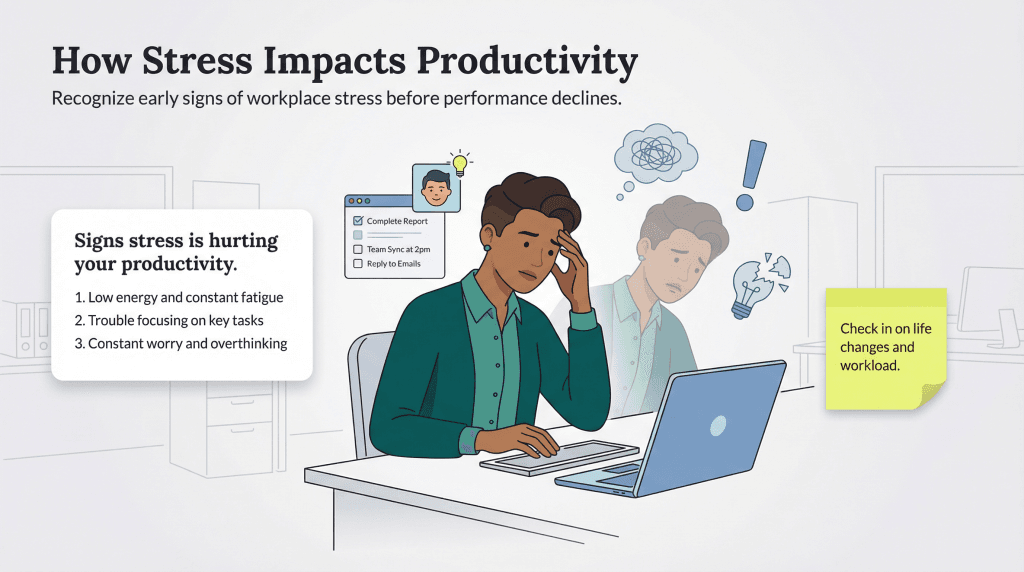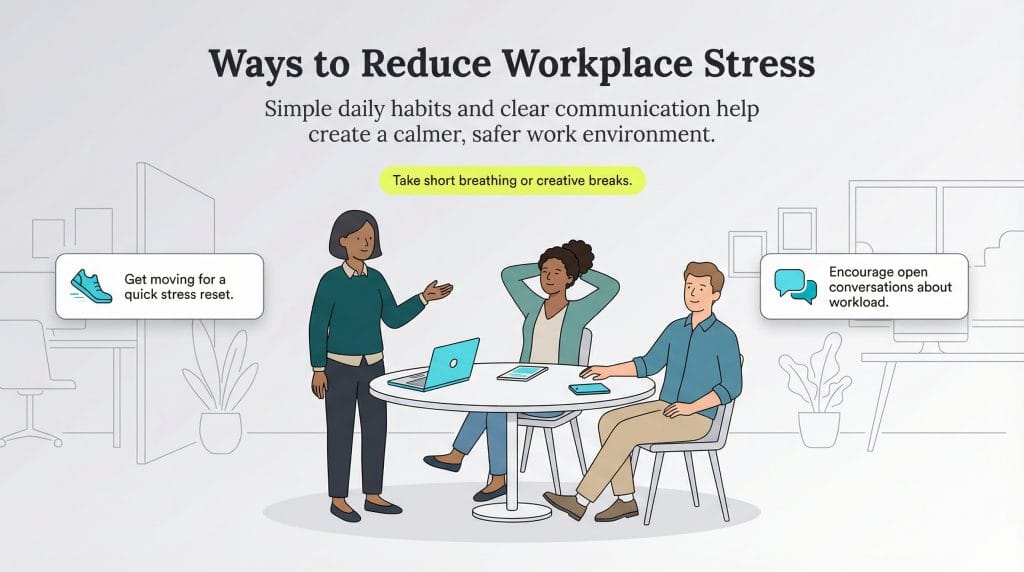Stress and anxiety rank among the most common workplace challenges. Nearly half — 49 percent — of North American workers reported feeling stress every day because of their work, according to Gallup’s 2024 State of the Global Workplace.
Workplace stress can have substantial consequences, such as burnout, low morale and high absenteeism. The repercussions can impact business productivity as well as a business’s financial performance. That’s why it’s essential for supervisors, managers, and employees to identify stress and anxiety symptoms and implement strategies to ease such pressures.
The impact of stress on productivity
Stress can affect any employee. It is often caused by life events, such as a change in responsibilities, job loss or promotion, death of a loved one, or illness.
Stress can sometimes motivate people and help them complete tasks on time or endure pressure. But, more often than not, stress results in poor focus, poor decisions and decreased creativity, according to Mason Farmani. “It causes people to feel overwhelmed, leading to errors and reduced efficiency,” Farmani, founder of Farmani Coaching, added.
Chronic stress can be detrimental to one’s physical and mental well-being — and impact effectiveness at work. The World Health Organization, for example, said that depression and anxiety cost $1 trillion of lost productivity in the U.S.
Here are some of the signs that stress is killing your productivity:
- Lack of energy: Stress is known to give you a burst of adrenaline. But, following the initial boost, it will rapidly drain your energy. This change will ultimately leave you emotionally and physically exhausted. The lack of physical and mental energy can prevent you from doing your best, which will have a significant impact on productivity.
- Lack of focus: Good production requires focus, but stress will take over your mind. This takeover will make it extremely difficult to focus on the task at hand because you are more focused on what caused your stress.
- Constant worry: Have you ever been so consumed with worry about something that could happen? Stress has a way of taking up your time by making you continuously worry about something that may or may not happen; this is time lost that could have been spent on more productive tasks.
- Reduced creativity: Being stressed causes your mind to wander, preventing you from locking in on new ways of thinking. “Some workers may experience cognitive overload … which totally impairs their ability to be creative and make informed decisions,” said Dr. Max Doshay, CEO and co-founder of Monima Wellness Center.
- Negative effects on personality: Not only does stress affect your emotions and physical abilities, but it also affects your personality. For instance, you may snap at peers without realizing that you are doing it, or you may become angry and/or yell at others without knowing you’re doing it. Many jobs require teamwork in some form. So, when you are snapping, moody or yelling at peers, it affects your ability to be productive. Plus, it affects the productivity of peers.
If you notice any of these signs in yourself, consider how recent life events or changes in responsibilities may be causing you stress. Addressing the root of your stress can help reduce its effects on your productivity and health. See our suggestions below.
How stress affects company productivity
One of the most common ways stress affects the overall production of a company is through absenteeism; about 1 million Americans take off each day due to work stress, The American Institute of Stress reported. Stress-related symptoms such as difficulty sleeping, high blood pressure and headaches take a toll, causing even those with good attendance to use up their sick days.
“Workplace stress affects team performance and organizational growth, as it’s not just an individual issue alone,” explained Steve Carleton, chief clinical officer at Porch Light Health. “Employees who work under stress experience a decline in their morale and their collaboration efforts, which plummets the chances of the success of the team.”
These are some other ways stress may affect your company’s productivity:
- Staff turnover: Stress in a company may lead to restless employees who have the desire to find a less stressful job. This ultimately creates an increase in employees quitting; such turnover forces your company to put more funding and time into hiring and training new employees.
- Tardiness: Almost every company has a few people who occasionally struggle with being on time. But, when employees who are typically punctual begin to have an increase in tardiness, it may be an indication of stress. This may be due to the fact that stress and anxiety often interrupt sleep, which makes it more difficult to wake up in the morning.
- Peer relationships: Unfortunately, stress also prevents otherwise energetic conversationalists from interacting with their peers. This is often due to them isolating themselves and being deprived of the energy required to make small talk or polite conversations. The lack of peer relationships and communication may eventually impact the company’s productivity.
- Quality of work: Stress can lead to fatigue, personality changes, withdrawal from others and a decrease in enthusiasm. Each of these changes can significantly impact the productivity of your company.
“The consequences of unchecked stress create a silent challenge in organizations,” said AK Ikwuakor, CEO of The Next Right Move and LeadLyft. Citing his company’s forthcoming research, Ikwuakor noted that deteriorating work performance, damaged relationships and compromised well-being often go unnoticed until serious issues arise.
“Leaders must understand that absence of visible stress doesn’t mean it isn’t affecting their teams,” he added.
How to reduce stress
It’s important to be informed as to how stress can impact you and your employees, but how do we change it? Here are some helpful ideas:
- Get physical: One benefit of exercise is the effect it has on stress. Not only does it pump your body full of feel-good endorphins, but it can also help you sleep better and aid in relaxation.
Other physical symptoms of stress, like changes in your gastrointestinal system, can be helped by exercise.
- Take a breathing break: A stressed body is in overdrive. Try taking five minutes to yourself and focusing on your breathing. This will help to slow your heart rate and lower blood pressure.
- Try a creative outlet: Working on an art or creative project is a great way to focus on a nonwork-related task that stimulates your brain. Adult coloring books are all the rage for this reason.
- Make your workspace more comfortable: It’s important to set boundaries between work and home. But, a healthy workspace that improves productivity doesn’t need to be stark. Add a few cozy elements that feel like home and consider investing in ergonomic office equipment. Your body and mind will thank you. [Read more about how open office plans affect workplace productivity.]
- Focus on the positives: Stressed thoughts often focus on negatives. Each day, set time aside to focus on the good by writing down at least three things that went right or unexpectedly well. Keep your list in an easily accessible place.
- Speak with a qualified professional: The events that cause stress can’t be changed, but the way you think about them can. A professional trained in cognitive behavioral therapy can help you rescript stress-causing thoughts as they happen.
As a business owner trying to combat employee stress, your No.1 priority should be the psychological safety of your team. According to the American Psychological Association’s 2024 Work in America survey, 43 percent of employees report feeling tense or stressed during their workday. However, that number climbs to 61 percent for workers who don’t feel safe at their jobs.
Communication is the most beneficial factor in reducing the amount of stress in your business. Encourage communication among teams as well as between managers and employees. Is a specific team member displaying signs of stress? If so, discuss and offer options as to how other team members and/or management may be able to help. Offer employees regular breaks and encourage exercise and healthy eating.
Lisa Birnbaum, a licensed clinical social worker and co-founder of Strengths Squared, urged employers to provide resources and promote flexible work arrangements in addition to open communication. “Access to mental health services, such as Employee Assistance Programs (EAPs), can help employees cope effectively,” Birnbaum told business.com. “[And] offering remote work options, flexible hours or personal time off supports better work-life balance.”
Setting realistic expectations for your workers will also mitigate stress. “By addressing stress proactively, organizations can not only safeguard individual well-being but also enhance productivity and teamwork,” said Birnbaum.
Kaytlyn Smith and Lauren Kubiak contributed to this article.













